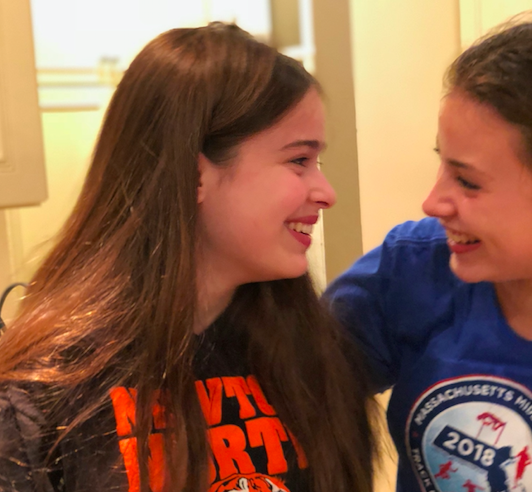My daughter got her license recently and, unlike some of you who are thinking, “Free at last!” I really feel like crawling into Child’s pose and waiting there for—I don’t know—the next 20 years or so.
It’s not that she isn’t a responsible or thoughtful teen. She is. Like seriously.
It’s me—this stamp of approval from the DMV means that my beloved first child is one step closer to flying the coop, leaving the nest, launching into the world. I’d be lying if I said that my nascent joy at her newfound independence was not met with strains of sadness, anxiety, and nostalgia.
And, I’m deeply ambivalent. I love being her mom. It hasn’t been without its frustrations, but the overall net assessment is that my heart opened in ways I never even imagined. It has given me purpose and meaning and clarity on what matters. And those new vistas will not be lost. But, making breakfasts, her humming to herself as she putters, talking about the details of her life in the car on our way here or there—all that will be jettisoned in favor of this emerging independence; increased time with friends, greater mobility, and ultimately, a new address when she gets to college and beyond.
And that is a level of letting go that I didn’t really see coming, which sounds ridiculous even as I write it. Because we all knew this was coming: this, the endgame we were promised.
Anyway, they say the hardest grief—and I know it’s not really grief, but this is a loss for many—can often be the anticipatory kind. Where the loss is imminent, and you are just waiting for the other shoe to drop. This purgatory-esque place of neither here nor there. One foot in the present, one foot in the future, and some disembodied limb blindly searching in the past.
Truth is, there will be sadness. There will be anxiety. There will be some pain. When I find myself pushing away these emotions—maybe because I “should” be happy at this milestone, or maybe because other moms seem to take it in stride so gracefully, or maybe because she is so happy that I’m expected to be happy too—I get even more lost.
Pushing away the emotions only reinforces their strength somehow. It doesn’t help the emotions dissipate, and it doesn’t help me feel more like myself. One approach that helps a bit is to borrow a page from Thích Nhât Hanh, the Buddhist monk, who might say to cozy up to that sadness as if it were a good friend. I’ve found it even helps to ask sadness what it wants to tell me—because it is most likely the sadness has a purpose.
I know it sounds a little corny, but somehow connecting to the sadness with respect for its appearance in our lives helps loosen its stronghold on our heart.
This phase of our lives is definitely coming to a close. It’s true that the “incidental time” together—especially those in the car, fresh from some activity or another, or anticipating going to school or wherever, are fewer and fewer these days. In light of this, I’m working on cultivating more “intentional time” with her. Intentionally giving as much of my attention to my daughter (as I can) when we are together, putting 100 percent of myself into the present moment, doing my best not just to hear her but to deeply listen.
And I can tell you that doing this is not easy—my mind still runs off to what else has to get done, who I might need to email or text later, or into some eddy of worried thinking about the future. Just like in meditation or yoga, however, I keep bringing myself back to the present moment, minute by minute. I haven’t mastered it yet, but I’ve already noticed an uptick in the quality and texture of the time we spend together, which makes me wish I had incorporated this perspective years ago.
It’s kind of funny and still true that this phase of life has echoes of toddlerhood all over it. The newness, the mobility, the inquisitiveness—and yes, the potentials for danger are present.
Back then, we taught them how to walk. Now, to drive. Then, we taught them how to navigate the English language. Now, we teach them how to navigate the potholes of high school and the college admissions process. Fundamentally, it has been a path of greater and greater independence all along—which we knew, of course—but recognizing this continuity across their life span can be comforting somehow. We are just doing what we’ve been doing all along, and so are they.
Perhaps by honoring our sadness and cultivating intentional time together, we can learn something else. It’s quite possible that for all that we’ve taught them, these amazing humans are now teaching us—teaching us how to let go. Bit by bit. Step by step. With grace, with gentleness, with love.
And I believe our greatest chance at acing this lesson will be our capacity to develop our intentional time with each of them, moment by precious moment.
~












Read 5 comments and reply